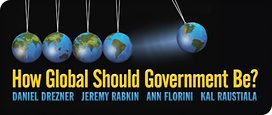I have progressed in my career by adhering to a few basic maxims: be as parsimonious as possible in developing a theory, be as detailed as possible in the presentation of evidence, and don’t get into a debate on Internet governance with Milton Mueller.
I will largely adhere to the third rule here, but to respond briefly to a few points in his post. First, he raises a fair question about my obsession with state power:
[O]ne of Drezner’s two ‘great powers’ is not a state at all – it is the European Union, a form of supranational economic integration among traditional nation-states. The EU is a radical and deliberate departure from the Westphalian model.
How can I argue that states are what really count when the EU is one of my primary actors? Couldn’t other states decide to form a similar grouping?
My answer is that the EU is such a whopping supranational exception that I’m not worried about copycats emerging anytime soon. It took the EU thirty years of struggle – backed by the U.S. security umbrella and the historical weight of centuries of continental wars – to get to the position of being a supranational entity that matters. No other regional grouping even comes close to the EU’s degree of integration right now, and I don’t think any of them will come close in the decades to come, either. Raustiala believes that EU is a harbinger of eroding norms of Westphalian sovereignty. For me, the EU is a sui generis case; there are no copycats at the moment, and for the decades to come, it will remain an exception rather than a trend.
Mueller raises another big theoretical question akin to those raised by Florini. They all argue that I’m underselling the power and influence of transnational civil society at the global level. For Florini, these groups have greater agenda-setting power. For Mueller, they can exercise voice at the global level.
On agenda-setting, I concede that occasionally, NGOs can influence agendas. The question is what happens next. As the TRIPS case suggests, initial declarations infused with activist agendas can fall victim to opportunistic implementation. Because it is so difficult for activists to keep the spotlight on, there might be a global parallel to Daniel Kono’s recent argument about “optimal obfuscation” at the domestic level. Governments are getting better at making public gestures towards NGO demands and then undercutting those gestures by either shifting fora to more arcane and remote settings, or using “all deliberate speed” in implementing concrete action.
I am more skeptical than Mueller about the global “voice” power of activists because their voice imposes fewer political costs on great powers. NGOs can try to exercise political voice as a means to lobby national governments. However, governments respond in a concerted fashion when the use of political voice signals economic as well as political costs from pursuing a particular course of action. Unless global civil society is capable of highlighting the material costs from changing a global governance setting, their use of political voice does not pack the same punch as actors with large asset-specific investments in the status quo (i.e., pharmaceutical companies or agribusiness).
Here endeth the positive analysis (i.e., the way the world is). In my next post, I hope to tackle the normative questions raised by Kal Raustiala and others.

